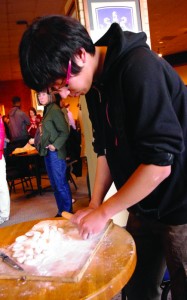The year of the dragon began Monday, but was celebrated Tuesday in the Curris Center. The International Culture and Languages Association (ICALA) sponsored this event.
There were a few differences in this year’s campus festivities than in previous ones.
“This year has more hands-on activities, including making dumplings, playing games and doing other activities to learn about the celebration and the culture,” Susan Drake, faculty adviser for ICALA, said.
One of the favored activities was the chopstick game. This involves passing a mini marshmallow back and forth using chopsticks. The balloon game was enjoyed and used to symbolize the firecrackers that are usually prevalent in the Chinese celebration.
An information table was available with the dates explaining which numerical year corresponds with the animal year according to the lunar calendar. This is the second year ICALA has celebrated Chinese New Year on campus.
There is an opportunity to learn about the Chinese culture and be educated on diversity. Dumplings are made from scratch and enjoyed as a tradition.
“Dumpling making, it is the indispensable part of the New Year celebration in northern China. Family and friends get together and chat while making dumplings together,” Jie Wu, Chinese language professor, said.
The most important part of the celebration is being with family. This is something many exchange students are missing out on this year.
“Family members get together, eat dumplings, wish for blessings for a new year. That is the most important part to all of Chinese people,” Zhuqing Han, freshman from Yantai, China, said.
The Chinese New Year starts with the first new moon. The celebration usually goes on for 15 days with different types of festivities held each day. Since this is the most important of holidays in China, it brings the entire family together when it is celebrated each year.
It is a legend that the different years are named after specific animals because Buddha asked all the animals to meet with him and 12 of them showed up and he named a year after each of them.
It is traditional to dress in red or other bright colors to scare away evil and to bring good fortune. There are traditionally fireworks, but in some places this has been banned for safety reasons. Children are given money in red envelopes as gifts.
On New Year’s Eve, a reunion dinner is held where the family gathers. Many people travel in order to meet with their families for the dinner. The first day is considered to be a welcoming of the deities and people gather with their relatives. It’s common for them to get together with their grandparents or great-grandparents.
The third day socializing is considered to be bad luck. Everyone grows one year older on the fifth day together. The jade emperor is then celebrated for three days. The very last day is the lantern festival. Instead of making resolutions, people in China wish for good luck and good fortune.
Contact Schimmel
